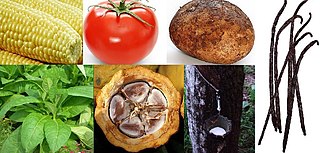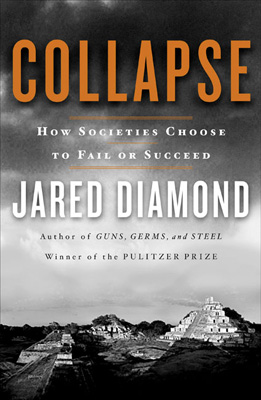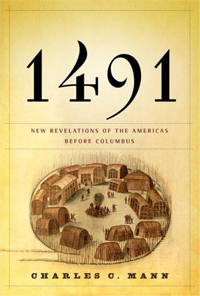
Environmental determinism is the study of how the physical environment predisposes societies and states towards particular development trajectories. Jared Diamond, Jeffrey Herbst, Ian Morris, and other social scientists sparked a revival of the theory during the late twentieth and early twenty-first centuries. This "neo-environmental determinism" school of thought examines how geographic and ecological forces influence state-building, economic development, and institutions. While archaic versions of the geographic interpretation were used to encourage colonialism and eurocentrism, modern figures like Diamond use this approach to reject the racism in these explanations. Diamond argues that European powers were able to colonize due to unique advantages bestowed by their environment as opposed to any kind of inherent superiority.

Guns, Germs, and Steel: The Fates of Human Societies is a 1997 transdisciplinary non-fiction book by the American geographer, historian, ornithologist, and author Jared Diamond. In 1998, it won the Pulitzer Prize for general nonfiction and the Aventis Prize for Best Science Book. A documentary based on the book, and produced by the National Geographic Society, was broadcast on PBS in July 2005.

Environmental sociology is the study of interactions between societies and their natural environment. The field emphasizes the social factors that influence environmental resource management and cause environmental issues, the processes by which these environmental problems are socially constructed and define as social issues, and societal responses to these problems.

The Columbian exchange, also known as the Columbian interchange, was the widespread transfer of plants, animals, precious metals, commodities, culture, human populations, technology, diseases, and ideas between the New World in the Western Hemisphere, and the Old World (Afro-Eurasia) in the Eastern Hemisphere, in the late 15th and following centuries. It is named after the Italian explorer Christopher Columbus and is related to the European colonization and global trade following his 1492 voyage. Some of the exchanges were purposeful; some were accidental or unintended. Communicable diseases of Old World origin resulted in an 80 to 95 percent reduction in the number of Indigenous peoples of the Americas from the 15th century onwards, most severely in the Caribbean. The cultures of both hemispheres were significantly impacted by the migration of people from the Old World to the New. European colonists and African slaves replaced Indigenous populations across the Americas, to varying degrees. The number of Africans taken to the New World was far greater than the number of Europeans moving to the New World in the first three centuries after Columbus.
The first European contact in 1492 started an influx of communicable diseases into the Caribbean. Diseases originating in the Old World (Afro-Eurasia) came to the New World for the first time, resulting in demographic and sociopolitical changes due to the Columbian Exchange from the late 15th century onwards. The Indigenous peoples of the Americas had little immunity to the predominantly European diseases, resulting in significant loss of life and contributing to their enslavement and exploitation perpetrated by the European colonists. Waves of enslaved Africans were brought to replace the dwindling Indigenous populations, solidifying the position of disease in triangular trade.

Collapse: How Societies Choose to Fail or Succeed is a 2005 book by academic and popular science author Jared Diamond, in which the author first defines collapse: "a drastic decrease in human population size and/or political/economic/social complexity, over a considerable area, for an extended time." He then reviews the causes of historical and pre-historical instances of societal collapse—particularly those involving significant influences from environmental changes, the effects of climate change, hostile neighbors, trade partners, and the society's response to the foregoing four challenges. It also considers why societies might not perceive a problem, might not decide to attempt a solution, and why an attempted solution might fail.
In human geography, McNeill's law is the process outlined in William H. McNeill's book Plagues and Peoples. The process described concerns the role of microbial disease in the conquering of people-groups. Particularly, it describes how diseases such as smallpox, measles, typhus, scarlet fever, and sexually-transmitted diseases have significantly reduced native populations so that they are unable to resist colonization.

Environmental history is the study of human interaction with the natural world over time, emphasising the active role nature plays in influencing human affairs and vice versa.

1491: New Revelations of the Americas Before Columbus is a 2005 non-fiction book by American author and science writer Charles C. Mann about the pre-Columbian Americas. It was the 2006 winner of the National Academies Communication Award for best creative work that helps the public's understanding of topics in science, engineering or medicine.
Ecological imperialism is an explanatory concept, introduced by Alfred Crosby, that points out the contribution of European biological species such as animals, plants and pathogens in the success of European colonists. Crosby wrote Ecological Imperialism: The Biological Expansion of Europe, 900-1900 in 1986. He used the term "Neo-Europes" to describe the places colonized and conquered by Europeans.
The following outline is provided as an overview of and topical guide to ecology:
Alfred Worcester Crosby Jr. was professor of History, Geography, and American Studies at the University of Texas at Austin, and University of Helsinki. He was the author of books including The Columbian Exchange (1972) and Ecological Imperialism (1986). In these works, he provided biological and geographical explanations for the question why Europeans were able to succeed with relative ease in what he referred to as the "Neo-Europes" of Australasia, North America, and southern South America. America's Forgotten Pandemic (1976) is the first major critical history of the 1918 "Spanish" Flu.

The historical origins of globalization are the subject of ongoing debate. Though many scholars situate the origins of globalization in the modern era, others regard it as a phenomenon with a long history, dating back thousands of years. The period in the history of globalization roughly spanning the years between 1600 and 1800 is in turn known as the proto-globalization.

In botany, a neophyte is a plant species which is not native to a geographical region and was introduced in recent history. Non-native plants that are long-established in an area are called archaeophytes. In Britain, neophytes are defined more specifically as plant species that were introduced after 1492, when Christopher Columbus arrived in the New World and the Columbian Exchange began.

In epidemiology, a virgin soil epidemic is an epidemic in which populations that previously were in isolation from a pathogen are immunologically unprepared upon contact with the novel pathogen. Virgin soil epidemics have occurred with European colonization, particularly when European explorers and colonists brought diseases to lands they conquered in the Americas, Australia and Pacific Islands.

1493: Uncovering the New World Columbus Created is a nonfiction book by Charles C. Mann first published in 2011. It covers the global effects of the Columbian Exchange, following Columbus's first landing in the Americas, that led to our current globalized world civilization. It follows on from Mann's previous book on the Americas prior to Columbus, 1491: New Revelations of the Americas Before Columbus.
Green imperialism or eco-imperialism or eco-colonialism or environmental imperialism is a derogatory epithet alluding to what is perceived as a Western strategy to influence the internal affairs of mostly developing nations in the name of environmentalism.

The Columbian Exchange: Biological and Cultural Consequences of 1492 is a 1972 book on the Columbian exchange by Alfred W. Crosby.

Biological globalization refers to the phenomenon where domesticated species are brought and cultivated in other favorable environments, facilitated by and for the benefit of humans. It has been defined as "the spread of plants domesticated in one area to favorable environments around the world". A growing and changing human population plays an important part on what plants are moved to new locations and which are left untouched.

The environmental history of Latin America has become the focus of a number of scholars, starting in the later years of the twentieth century. But historians earlier than that recognized that the environment played a major role in the region's history. Environmental history more generally has developed as a specialized, yet broad and diverse field. According to one assessment of the field, scholars have mainly been concerned with "three categories of research: colonialism, capitalism, and conservation" and the analysis focuses on narratives of environmental decline. There are several currents within the field. One examines humans within particular ecosystems; another concerns humans’ cultural relationship with nature; and environmental politics and policy. General topics that scholars examine are forestry and deforestation; rural landscapes, especially agro-export industries and ranching; conservation of the environment through protected zones, such as parks and preserves; water issues including irrigation, drought, flooding and its control through dams, urban water supply, use, and waste water. The field often classifies research by geographically, temporally, and thematically. Much of the environmental history of Latin America focuses on the nineteenth and twentieth centuries, but there is a growing body of research on the first three centuries (1500-1800) of European impact. As the field established itself as a more defined academic pursuit, the journal Environmental History was founded in 1996, as a joint venture of the Forest History Society and the American Society for Environmental History (ASEH). The Latin American and Caribbean Society for Environmental History (SOLCHA) formed in 2004. Standard reference works for Latin American now include a section on environmental history.














